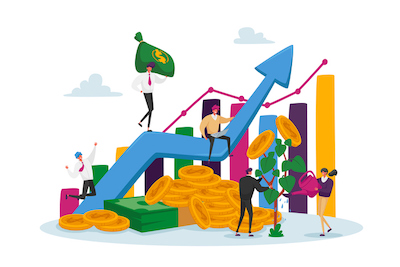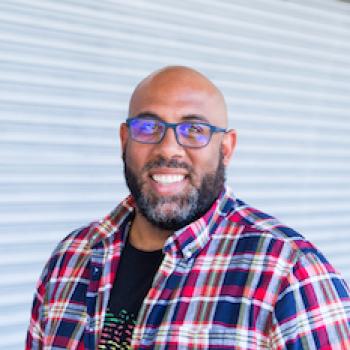For this bonus episode of Raci$m Is Profitable, Former US Labor Secretary Robert Reich joins Solana Rice and Jeremie Greer to look back at earlier episodes and discuss the shared themes — and visions — that emerge. From redefining belonging to demanding that public dollars be equitably and democratically spent, we dig into what “racism is profitable” really means.
This transcript has been edited and condensed. You can listen to the full episode here.
Jeremie Greer: We had Demond Drummer from PolicyLink on an earlier episode. We talked a bit about the Federal Reserve and how it works. And one of the things he said is that there is nothing this country can’t afford when we choose to do it.
Robert Reich: We have a billionaire class: 760 people who, over the last two years during the pandemic, increased their wealth by $1.2 trillion dollars! Trillion, not billion. If you had a wealth tax that sopped up a lot of that wealth, they would still be doing better than they did two years ago. In other words, there is absolutely no limit to what we can and should be able to do for our people in order to invest in them. And public investments, by the way, pay for themselves. I mean, if if we put money into preschool, if we put money into early childhood education, if we put money into childcare, put money into anything that has to do with young people, and giving them better opportunities, giving them better education, giving them a better start — well, that means they’re going to be more productive. That means they’re going to be less costly in terms of every measure of cost in our society. That means these investments pay off big; we shouldn’t even be worrying about anything we’re talking about in terms of cost.
Solana Rice: I mean, you bringing that up, though, reminds me of this State of the Union address that we’ve just heard. And this idea that we need to fund police and not all of the things that you just mentioned. And I’m like, who was in the room when folks are writing that State of the Union? You’ve been in these rooms where big decisions are being made. Seems like when it comes out on the other end for us, it’s kind of coded about racism, it’s kind of coded about who gets to have what, who doesn’t get to have what. Have you been in rooms where you’re just like, “Wait, why are we really still dependent on this deservedness narrative, on this scarcity narrative?” Are the conversations in those rooms just blatant? Or are you decoding as well?
Reich: Yes. And that’s the short answer. The longer answer is that it doesn’t matter what I thought, or think. I mean, the people who have the most influence over the State of the Union addresses, or really over much of what Joe Biden or Kamala Harris or anybody in the administration does day by day, are political advisors. And they have their eyes, especially once you’re in the gravitational pull of the midterm elections or they’re after the general election of 2024, they have their eyes on the election, they have their eyes on public approval, the likelihood of getting people out or not getting people out. Why did that particular phrase get into the State of the Union? I’m sure, based on my experience, that it was political advisors saying, “Mr. President, defund the police has been utilized by conservatives to scare middle class and working class whites. And particularly in states that we need. And you know, these are swing states, and these are suburbs. And we’ve got to take away their ammunition.” Was there some other political adviser there saying, Mr. President, we need young people and people of color in the next election to be motivated to get out there, and if you say something like that, their motivation is going to drop? Well, maybe there was a three minute discussion between those two sets of political advisors as to what’s going to net the bigger positive. But that’s, unfortunately, what it comes to.
Greer: Bob, I wonder how this stuff gets codified in policy? In our earlier podcast, we talked about the welfare queen narrative and how that became pervasive and shifted certain people’s perspective on social programs like welfare and food stamps and things like that. So how do narrative conversations like that make themselves into a policy that actually really affects people on a day-to-day basis?
Reich: Generally speaking, Jeremie, you’ve got people in, let’s say, Biden’s White House, who want to do the right thing, defined as what the country ought to be doing in terms of moving toward a more just, fair society, including obviously people of color. Now, they have to make sure the political advisors are with them. I used to have this debate with a fellow named Dick Morris in the Clinton White House. Dick Morris was the pollster; he was a political adviser.
Greer: Wait wait wait, a pollster was telling you, economist, about some policymaking thing?
Reich: Oh, I had to sell him. And I would say, “How about the president doing this or that?” And he’d say, “Well, if the President says this, or wants to do that, he’s not going to be reelected. And if he’s not reelected, you have a zero chance of ever doing this or that.” And that’s the kind of chicken-and-egg show we got into over and over again. I think there are a lot of people around Biden who want to do the right thing. And they’re good people; it’s a good staff. In fact, if I look back over the last three Democratic administrations, I would say, this White House staff is the best. It has the fewest Wall Street shills, certainly fewer than the Obama or the Clinton White House. But they are constantly locking horns with the political people about what gives the Democrats the best chance of keeping the House and or the Senate, and what gives Biden and Kamala Harris the best chance, depending upon who’s going to be running in 2024, of keeping the White House.
Rice: So what kind of political power do we need to be building in this moment in order to make sure that the pollsters are really taking into account the future of the progressive movement, the future of the nation, which is mostly people of color? How do we energize the young people and people of color? I know that’s funny coming from a young person of color, but I’m curious about your thoughts.
Reich: I would say, honestly, you and Jeremie and others, who are young and people of color and politically motivated, are the key to the future. That is not just the Democratic Party, but all of American politics. And to the extent that you organize, energize, and mobilize, then that is going to find its way into the brains of the political people who are advising any president or any major politician. It’s as simple and as direct as that. Now, the difference, though, may be in terms of time horizon. The people who are political advisors in the White House, they’re just looking at the next election cycle. They’re not really looking, you know, two administrations from now, they don’t really care. But I think that, to the extent that there is an understanding of how much power young people, people of color, progressives actually bring to the table in getting out the vote — and getting out the vote is a big, big piece of this — then the political people in the White House and the political people in the Senate and and in the House will act accordingly.
Greer: So how did this play out?
Reich: Some of the policies, like a minimum wage increase, are extremely popular. And that’s why, in election years, minimum wage increases occur. In non-election years, they don’t occur. So you just need to know, there’s a kind of ebb and wane to what can be done when there are openings. In 1996, I went to Bill Clinton and said, “Can we just please raise the minimum wage?” And he said, ” You gotta ask Dick Morris, the pollster.” So Dick Morris said, “Well let me do a poll.” The very next day, I got a call from him saying, “You’ll never guess what, 80% of Americans are in favor of raising the minimum wage.” I said “Dick, how did you get that poll result so fast? Did you poll members of your family? Was that how you did it?” But I then had Dick Morris’s poll results, and I went back to the President, and I went to the House and Senate leader. At that time, it was all Republican. But it didn’t really matter because they looked at those polls, they had conversations with the National Restaurant Association, small businesses, all the people who normally hate minimum wage increases and said, “Look, it’s time, we don’t want to be penalized at the ballot box.” And got it. We got a minimum wage increase. One of the last ones to get through Congress, but that’s with a Republican House and a Republican Senate. And something in the order of 30 million Americans got a wage increase that day, on the vote. Is that possible again? Absolutely. If you could do it with a Republican House and Republican Senate, we can do it now. On other issues though, it’s more complicated. Minimum wage, everybody understands it. Medicare for All, the forces against it can say, “Oh, you’re gonna lose your doctor, you’re gonna lose this, you’re gonna lose that, you’re gonna lose your employer provided health care.” It’s hard, as Bernie Sanders and Elizabeth Warren both saw, if you have to come back and explain a negative, then you’re halfway gone to begin with. What are some other examples of policies? I think what I’m saying is, it depends on the year.
We had a perfect experiment on the expanded child tax credit. We know what happened to child poverty before. We know what happened to child poverty when we had it in that six month window. And we know what’s happened to child poverty since. It’s absolutely clear that you reduce child poverty by 30 to 40% with a refundable child tax credit that’s expanded in exactly the way that we did. But how far does that policy argument go? Well, it doesn’t go very far.
Rice: Here’s a contradiction I feel though, Bob, and I don’t know what to do with it. We are saying that people turning out to vote is really important. And we’ve just laid out several examples of where personalities come into play, politics come into play. How do folks reconcile, like, yes, I should vote. And I understand that there’s so much more to politics than voting. You’ve got these special interests, you’ve got folks like the Chamber of Commerce and all these special interest groups that are just like, “Nah, we’re gonna shut that down.” Yes, we should vote. And how do we build power in those spaces that people of color are often not allowed to enter?
Reich: Well, I think the way to argue about doing it is number one, demographics. Demographics are on our side, in terms of people of color and young people. And the whole Republican paranoid reaction, and the proto-Trump stuff that’s going on right now around the country is all a fear about more and more people voting. But that’s demographics. Demographics are destiny; that’s going to happen. So that’s number one.
Number two, I think a lot of people should take some encouragement from the 2020 election. A lot of good things happened. I mean, we never expected Georgia, for example, to come up with two Democratic senators. And the number of people of color actually moving into politics — and young people. I think that there has been a huge slow-moving revolution in the making. And that it’s going to happen in fits and starts. This fall is going to be a big test for all of us. It’s going to be hard work. And we have to understand that. But we also have got to be patient. Patience is critical here. Nothing is going to change right away. But I would be very surprised if we were having this discussion in eight years or four years, and things had not improved dramatically.
Rice: What I also hear you saying though is that taking power just takes time. That we should be doing that work. But we don’t have to wait forever.
Reich: Don’t wait in terms of being politically active or energized or organizing; do it now, and do it with extraordinary effort. And do it with as many people as you possibly can. But in terms of your expectations, your understanding of the speed of change, when you’re dealing with the structure of power, you need to understand that it’s not going to happen overnight.
Greer: We had come to you with the idea of doing a video called “racism is profitable.” And we focused on the prison industrial complex. And, you know, you were like, right away, “Oh, I see this so many places in the economy.” I just wonder, over the years, how have you seen that show up over time? And then where do you see it showing up over and over again in the work that you’re focusing on today?
Reich: Well, you can see it, even today. The military contractors are celebrating what’s going on in the world, in terms of Putin’s invasion of Ukraine. Military contractor and defense industry stocks are going through the roof. I don’t want to accuse them of being in any way unAmerican. But the fact of the matter is that as the situation deteriorates in the world, there are people whose job it is to maximize the shareholder value of institutions that are in the business of killing people or [in the case of] the prison industrial complex of confining people or creating a world that is a pretty bleak, awful world. And we’ve got to understand that they are in the game as well. They are a political influence. Now, in the best of all worlds, these people, particularly government contractors, whether we’re talking about the military industrial complex or the prison industrial complex, these government contractors should not be able to lobby or make campaign contributions because they’re getting money from the government. And maybe we can get to a point where we have campaign finance reform that makes that impossible. But for now, they really are players. And we’ve got to understand that, and we’ve got to name them. And we’ve got to make people very aware of what they are doing.
Greer: What is the way to rebalance that?
Reich: I think the first step is not to celebrate or in any way talk about the goal as being government. Government in our history, going back to the beginning, was always a problem. I mean, we hated the British government; this country was born out of a revolution against centralized power. The government is not popular. We had a brief period from 1929 through, let’s say, the Cold War, and that was a period where we had a depression and a hot war and a Cold War and government was necessary. People rallied behind the United States — but not behind the government. And there’s a difference. We love our system of government, at least many people do. Most of us do. We don’t love government, per se. And I think it’s important to keep that in mind. The goals that we’re talking about — that is a goal in which our children are taken care of, that our children don’t go for lack of food or lack of shelter, they have good education, they can become effective and productive citizens and participants in our society — that’s something we can agree on. People also understand that over the kitchen table, the problems are almost exactly the same, regardless of our race. You know, people can’t pay the bills. You know, gas prices are hitting $4 a gallon — in California, $5 a gallon. People have to drive to work and get caught in traffic. I mean, this is where people live. Start where people live. Don’t talk about labels, don’t talk about Republican or Democrat or Donald Trump or progressive or socialist. Just start where people are. And it’s amazing how far you can go.
Rice: Okay, this is we’re gonna do a rapid set of questions. If there was one federal agency you could take apart and rebuild, what agency would that be?
Reich: The Defense Department.
Rice: If you were to run for president, what would your campaign slogan be?
Reich: The people versus the powerful.
Rice: The last good laugh you had?
Reich: Just a couple of seconds ago with you guys. And actually, let me just pause there because that’s an important point. I think anybody who’s involved in our civic or political life — you can’t take yourself too seriously, but you have to take the issues very seriously. Gotta laugh. If you don’t find humor, you’re really cooked.


